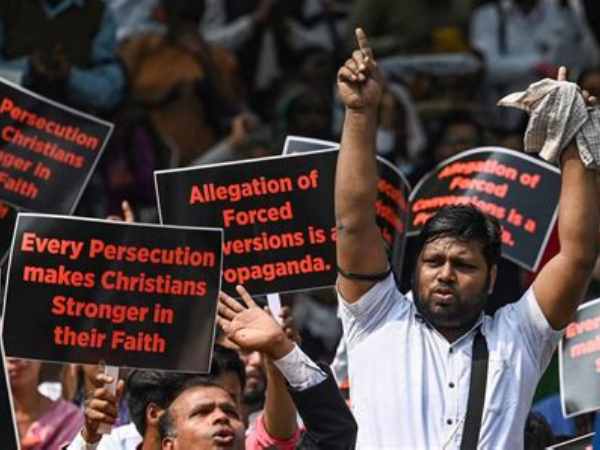The Christian Community in the district of Kanker in the central Indian state of Chhattisgarh has planned to organize a public rally in protest of the ongoing discrimination against Christians in the area.
The public protest named “Nagarik Astha Adhikar Rally,” or the “Civil Rights Rally” in short, is being organized by the Rashtriya Christian Morcha, a nation-wide civil rights advocacy group, in association with the Christian community in Kanker. No date has been set.
Numerous villages in the Kanker district previously erected billboards banning the entry of pastors and “converted Christians,” creating fear among members of the Christian minority.
The warnings declared these villages off-limits to Christian missionaries or evangelists, citing provisions of the Fifth Schedule and the Panchayats (Extension to Scheduled Areas) Act, 1996, also known as the PESA.
The Rashtriya Christian Morcha sent a flyer via social media, calling on Christians to turn out in large numbers and join the rally in unity and solidarity to uphold justice, equality, and the values of the Indian Constitution.
Some key demands expected to be highlighted during the rally include the allocation of public graveyards in every village for Christians and the end of the harassment of Christians under the false interpretation of the PESA.
The rally will also press upon district authorities to prevent social, economic, and religious exclusion based on faith by taking down billboards banning pastors, missionaries, and converted Christians in 14 villages.
Meanwhile, the High Court of Chhattisgarh disposed of a writ petition raising the issue of segregation of the Christian community and their religious leaders from the mainstream village community, with the misuse of PESA.
The petition had sought the removal of billboards prohibiting the entry of pastors and “converted Christians.”
The court stated that billboards erected to prevent forcible conversion by allurement or fraudulent means cannot be termed unconstitutional.
The court also observed that the petitioner did not avail any alternative statutory remedy before approaching the high court.
“A party must firstly exhaust the statutory alternative remedy available before approaching the High Court seeking redressal of any grievance,” the order stated.
To read more news stories, visit the ICC Newsroom. For interviews, please email [email protected]. To support ICC’s work around the world, please give to our Where Most Needed Fund.
The Islamic State West Africa Province (ISWAP) is a terrorist organization that emerged in 2016 after splitting from Boko Haram. It is affiliated with ISIS and operates primarily in Nigeria and the surrounding region, targeting both civilians and military forces.
ISWAP has been responsible for numerous attacks, including assaults on Christian communities, kidnappings, and executions, as part of its broader jihadist agenda.
Learn More
These violent actions contribute to ongoing instability in northern Nigeria, where religious and ethnic tensions remain high.
The international community, including the United Nations and several governments, has condemned ISWAP’s attacks, recognizing them as acts of terrorism.
Learn More
Sign up to keep up to date with the latest Persecution news, see your gifts in action, and find out how to get involved to help persecuted believers worldwide.
Financial information | Privacy Policy
International Christian Concern is a registered 501(c)(3) non-profit charity.
2020 Pennsylvania Ave. NW #941 | Washington, DC 20006-1846 | Phone: 800-422-5441
